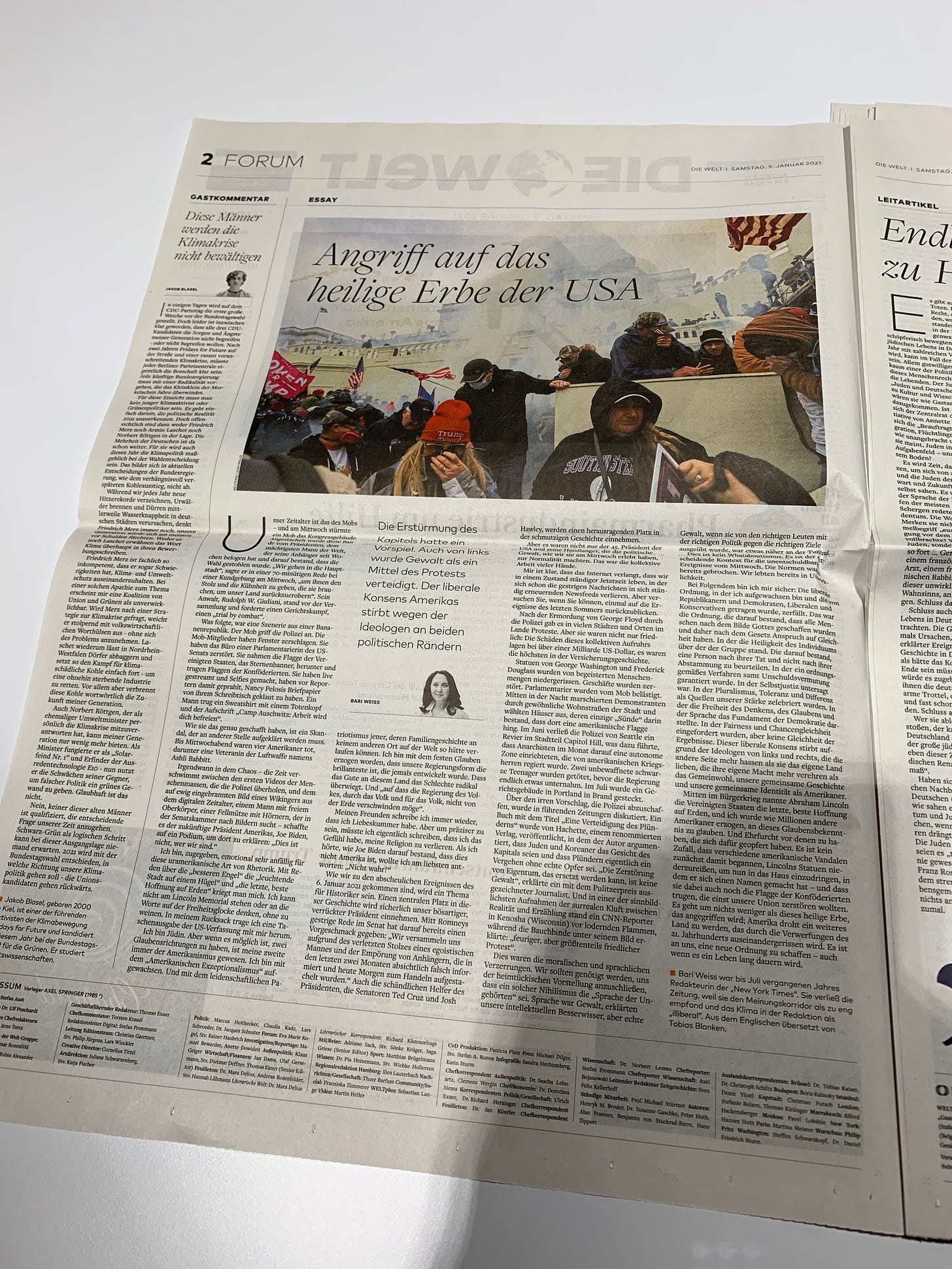
The Free Press

Thought comes before action. Words come before deeds. Media that profits from polarization will stoke it. Lies — maybe harmless for the moment, maybe even noble — create a lying world.
I’ve known this for a while. It’s why I left The New York Times. And it is why, as much as I miss doing journalism, I’ve been cautious at every next step.
Hate sells, as the journalist Matt Taibbi has convincingly argued, and as anyone looking at Twitter trending topics over the past few years can see. If Americans are buying rage, is there a real market for something that resists it?
Hate sells and hate also connects. Communities can grow quite strong around hatred of difference, and that’s exactly what’s happened to the American left and the right. It is painful to resist joining a mob when that mob includes most of your friends. It feels good, at least in the short term, to give in.
So part of my hesitation about what comes next is that I have been unsure about who will have the strength to stand apart from the various tribes that can give their members such pleasure of belonging. It is hard to know how to build things that are immune to these dangerous forces when the number of the people who are — or appear to me — immune to it is so very small.
Perhaps a psychologist can explain what makes these people resistant. Is it personality type? Is it principle? Is it rootedness in a real community with real people who you love and who love you and who you trust when they call you out on your bullshit?
I don’t know the answer. But I know that you have to be sort of strange to stand apart and refuse to join Team Red or Team Blue. These strange ones are the ones who think that political violence is wrong, that mob justice is never just and the presumption of innocence is always right. These are the ones who are skeptical of state and corporate power, even when it is clamping down on people they despise. The ones who still hold fast to the old ideas enshrined in our constitution.
I am lucky to know more than most. A good number of them are people who I once regarded as my ideological enemies. Or rather: they are people who I still regard as my opponents on any number of issues that are extremely important to me, but who see clearly that the fight of the moment, the fight that allows for us to have those disagreements in the first place, is the fight for liberalism.
One of those people is Robby George.
Robby is among the most important Catholic intellectuals of our era. He is a Princeton professor, a lover of great wine, a wonderful writer, a total gentleman, and one of the most articulate opponents of gay marriage in the country.
Now is a good time to say that as soon as the pandemic ends I plan to invite all of my friends to an inappropriately large wedding where I will stand under a chuppah and marry a woman (Nellie Bowles, the love of my life). I am profoundly grateful that we have that right. And I’m grateful for all of those, including my friend Andrew Sullivan, who waged the battle to win it.
Robby might not want to go to a gay wedding. But I love that at least for now I still live in an America where he and I can sit together, over good food on a dark night in the middle of a pandemic and talk about what is broken and how we might join together to fix it. That act is the whole point of the American experiment.
So that’s how I found myself at dinner in New Jersey a few weeks ago with Robby and Sergiu Klainerman and Joshua Katz — all professors who stand against the censors. We were talking about what this moment was asking of us and what could be around the bend, what was coming and how to prepare.
Robby pulled out his phone, then, and asked what I knew about Heinrich Heine. I knew the Nazis had burned his books, that he was a Jew who had converted to Christianity. That was about it.
In 1834, Robby told me, Heine wrote a prose poem that prophesied the evil that would swallow Europe a century later. He read it to the table:
“Christianity — and that is its greatest merit — has somewhat mitigated that brutal Germanic love of war, but it could not destroy it. Should that subduing talisman, the cross, be shattered, the frenzied madness of the ancient warriors, that insane Berserk rage of which Nordic bards have spoken and sung so often, will once more burst into flame. This talisman is fragile, and the day will come when it will collapse miserably. Then the ancient stony gods will rise from the forgotten debris and rub the dust of a thousand years from their eyes, and finally Thor with his giant hammer will jump up and smash the Gothic cathedrals.”
Tears rolled down my face as he spoke these lines, as they do now as I re-read them:
“Do not smile at the visionary who anticipates the same revolution in the realm of the visible as has taken place in the spiritual. Thought precedes action as lightning precedes thunder. German thunder is of true Germanic character; it is not very nimble, but rumbles along ponderously. Yet, it will come and when you hear a crashing such as never before has been heard in the world’s history, then you know that the German thunderbolt has fallen at last. At that uproar the eagles of the air will drop dead, and lions in the remotest deserts of Africa will hide in their royal dens. A play will be performed in Germany which will make the French Revolution look like an innocent idyll.”
How did Heine see it? How, a hundred years before Hitler, did he possess the terrible vision that “a play would be performed in Germany which will make the French Revolution look like an innocent idyll”?
He understood, first, that the “talisman” was fragile, that the veneer of civilization was so much thinner than most people understood. And he understood that if it was torn “the ancient stony gods,” who never really died, could be awakened from their sleep once again.
Second, Heine saw with total clarity that revolutions in the street begin as revolutions in sense-making. “Do not laugh at one who foresees in the region of the visible the revolution that has already occurred in the invisible domain of the spirit. Thought precedes action as lightning precedes thunder.”
The invisible revolutions of the 21st century — revolutions that began with word games and lies — are increasingly apparent in the “region of the visible.”
Did we hear, in the shattering glass and gunshots at the Capitol on Wednesday, our own version of Heine’s prophetic crashing? I’m not sure if that horrific date will be the our grandchildren will remember or if it will be another. What I am sure of now is that there will be more thunder.
For a while now I have thought of this period as a great unraveling — the unraveling of the old truths, the old political consensus, the old order, the old conventions, the old guardrails, the old principles, the old shared stories, the old common identity.
The metaphor of the unraveling is true enough, but it fails to capture the takeover and the unimaginable strength of the new powers that have superseded the old ones. My friend David Samuels has dubbed it the age of the machines and I think that gets it right.
“The machines ate us,” he wrote in Tablet last month. “We are all sick with the same disease, which is being pumped through our veins by the agents of a monopolistic oligarchy — whether they present themselves as the owners of large technology companies, or as the professional classes that are dependent on those companies for their declining wealth and status, or as identity politics campaigners, or security bureaucrats. The places where these vectors converge make up the new ideology, which is regulated by machines; the places outside this discourse are figured as threats, and made to disappear from screens and search results, using the same technologies that they use in China.”
The machines ate Ashli Babbitt, the 35-year-old Air Force veteran and Obama voter who slid into the gutter corners of the MAGA web and followed the siren song of Q to the capitol before bleeding out for the president in the people’s house.
The machines ate the former Jeopardy! champion and left-wing Twitter pundit Arthur Chu, who wrote that Babbit was “a pile of meat that moved and spoke and acted like a person was made to stop moving, and thus could no longer fool people into thinking it was one of them.” He said of her death: “You should feel less bad than you do about putting down a rabid animal.”
When a person with a blue check mark openly calls another human being, a fellow citizen, a “pile of meat” you should be very worried about what comes next.
You can log off. You can get into psychedelics or reading the stars or overpaying for bath oils. And maybe those are the wise things to do. But all the #selfcare in the world won’t save you from living in the time you and I were born into.
I think David’s advice is wise: “The good news is that the most important events of my life, and your life, will always take place more or less within a 25-foot radius of wherever we are standing. Like the Beatles said, all you need is love. So, try to be kind, and avoid making sweeping statements about large classes of people. Give food to the hungry. Tell your children that you love them. And please, whatever you do, don’t embrace anyone’s sweeping program for remedying historical injustice, because history’s victims are already dead—and soon, there will be plenty more of them. I can hear the sound of the engines revving up, even from here.”
I heard them loudly this weekend.
Now those machines, operated by people none of us elected, have begun an open war against us.
It’s not that Trump was permanently banned from Twitter. I’d be happy to never hear that voice or see those CAPS again. It’s that Twitter can ban whoever it wants whenever it wants for whatever reason. It’s that all the real town squares have been shuttered and that the only one left is pixelated and controlled by a few oligarchs in Silicon Valley.
We were promised the Internet would be better than democracy. But then it got privatized. Corporations own it. There is no online bill of rights. There is only the frenzy of the mob and fickle choices of a few billionaires.
Please spare me the impoverished argument about the free market and private companies not being bound by the constitution. Barring businesses from using online payment systems; removing companies from the App Store; banning people from social media — these are the equivalent of telling people they can’t open a bank account or start a business or drive down a street. (To my mind, David Sacks, who has spent his career building and funding tech companies, has been articulating this more powerfully than anyone out there. Follow him here.)
That almost every credentialed journalist and liberal public intellectual appears to be cheering on this development because it’s happening to the Bad People is grotesque. They will look like fools much faster than they realize.
On Saturday night, I asked a bigwig in Silicon Valley how we could build new things that aren’t vulnerable to being purged or compromised or otherwise demolished by the forces of Facebook and Twitter and Apple and Google and Amazon.
“Used mimeograph machines,” he replied.
Before I buy this one on e-bay for $489, I figured it was better to start here.
I have some ideas for what the future holds for me. A few of those projects will be launching in the coming weeks. Others are longer-term.
To announce my columns, events and book in the past, I’ve used Twitter. But as these platforms crack down, there’s obviously a chance that won’t be possible in the future. I’ll continue to tweet out my work, but I’ll also be sharing it here.
On Thursday (10 a.m. EST) I’ll be doing an event with Jonathan Haidt, Katie Herzog and Suzanne Moore on the state of the press. Sign up here.
This weekend I wrote a column for the German newspaper Die Welt about the vile events of January 6, 2021, and what they portend. You can read it here in English.
I don’t speak German, but was really excited to see it on page two:
If you’ve made it all the way here (hi, dad!), thanks for reading.
If you like my writing; if you are interested in politics, culture and Judaism; if you want honest commentary and trustworthy reporting; if you’d like to be exposed to other people who are doing similar work: I’d be thrilled if you’d sign up.














I've been a journalist probably longer than you have, Bari. Back in the days when Larry Rohter was the NYT man in Rio. And I was reporting for The Boston Globe. I recall introducing myself to him at an event ahead of what would be the historic electoral victory of Lula. The Nyt had just bought the globe. I introduced myself, held out my hand.... He looked at me and sat down.
So screw the NYT.
Media needs a house on fire. Trump was that. 9/11 and the bogus Iraq War was that. Covid is that. If your house is burning down, you will use all of your time and efforts to put out the flames. If it is not burning down, then you and every member of your household is: playing on your x box; having a drink with the spouse at the kitchen table; reading junior a bed time story (but not from that rrrrrrrrrrrracist Dr Seuss!); maybe having sex even....is that still a thing? It means your attention is divided and not on them. They need stress and drama and fear and panic. It's a totally toxic industry cuz working to put out and start fires all day is meaningless and not sustainable. Nor is it realistic. Nothing burns forever on this good Earth.
Tune out. Youll actually learn more that way.
Then and now, a common symptom of impending, often violent, dysfunction in society seems to be a widespread affinity for the political hacks who are the titular heads of the 'tribes.' Amongst my own friends and family members I am frequently amazed at the emotional attachments to the media-packaged humans known as politicians where they are often referred to by their first names in revered tones... Seems a little nuts to me.
Ms. Weiss - politically speaking we are not closely aligned but on a human level I am a huge fan, especially as you champion common sense, collegiality, and personal courage. I greatly admire you and your eloquence.